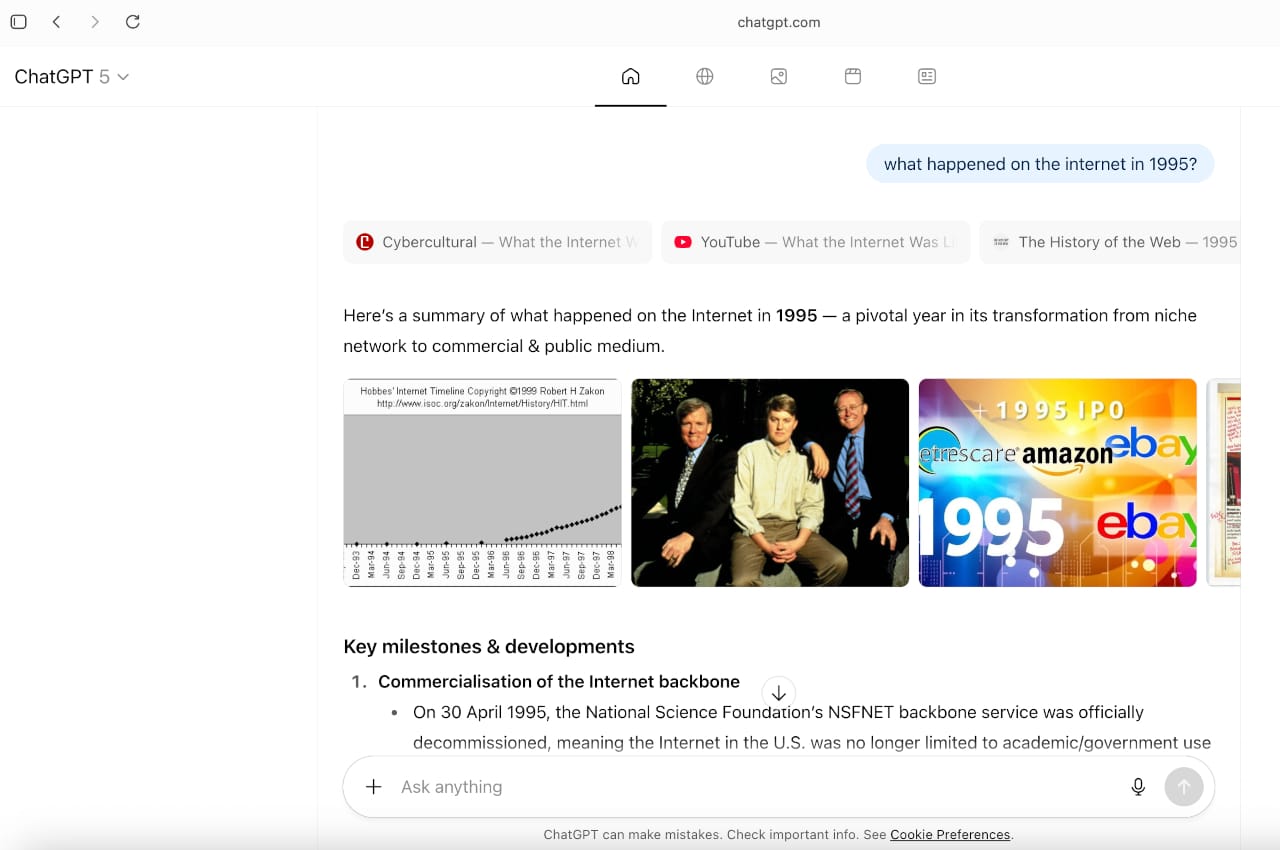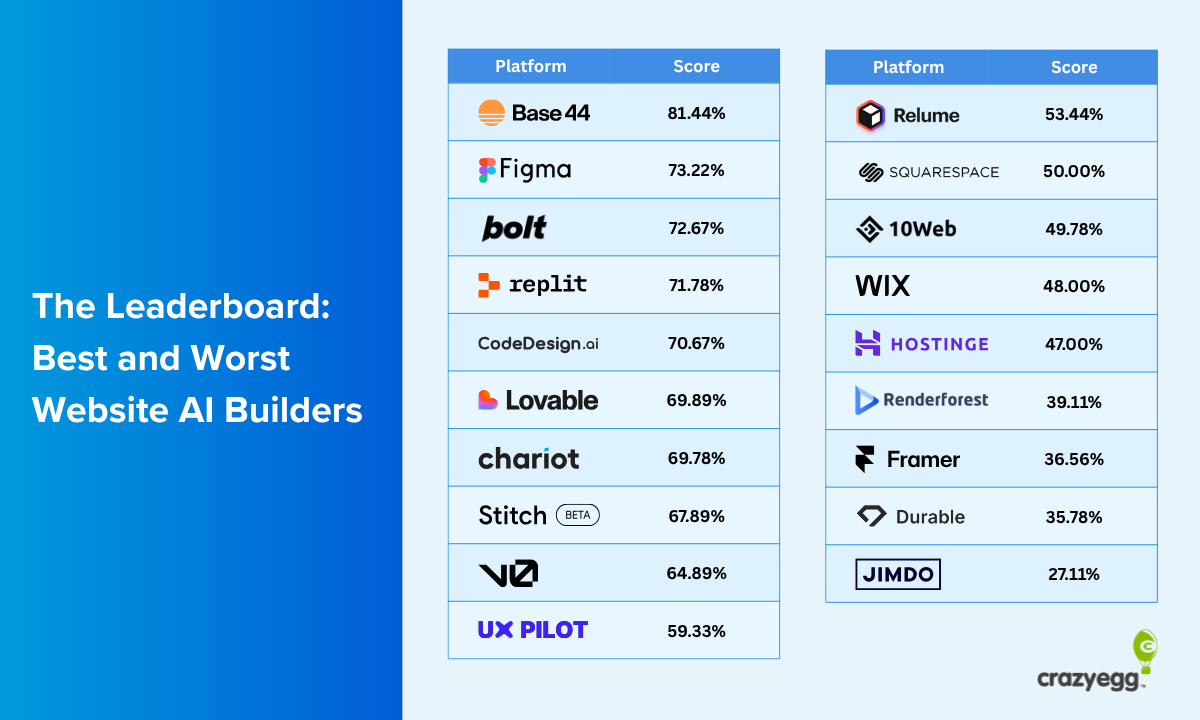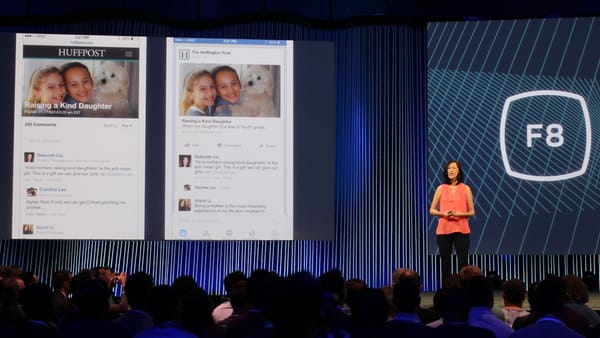A New Web Browser From OpenAI: Initial Reactions to Atlas

The big news this week was the launch of OpenAI's new browser, Atlas, which further validates my thesis that the web has become the UI layer for AI systems. Reactions to Atlas have been mixed (I have a selection of quotes below), but so far I have two main takeaways:
- The product itself is slick, as you would expect from an engineering team led by Ben Goodger (who was an early engineer on both Firefox and Chrome). But I am concerned about how Atlas treats websites as almost second-class citizens, and also the privacy implications of OpenAI gobbling up all your browsing data.
- For web professionals, once again this shows how OpenAI is using web technology to build out its platform — some might say that Atlas is an attempt to create an "OS for AI," although personally I think that's too simplistic. But certainly, web technology has become a key weapon for OpenAI with the launches of ChatGPT apps (which use web tech) and now Atlas.
On the first point, Anil Dash published a strongly worded post this week that accuses OpenAI of building an "anti-web" browser. He points out that often you don't even see obvious websites in the search results:
"I had typed "Taylor Swift" in a browser, and the response had literally zero links to Taylor Swift's actual website. If you stayed within what Atlas generated, you would have no way of knowing that Taylor Swift has a website at all."
I tested this by opening a new tab in both Atlas and Google Chrome and typing: "what happened on the internet in 1995?" In Chrome, my website Cybercultural comes up as the first link in Google's search results — actually, my link shows up twice, to the side and below the "AI Overview." On Atlas, which defaults to a ChatGPT search, my post is less visible — and also, in my view, less likely to be clicked since OpenAI has 'trained' us to use ChatGPT as an answer-engine.

This is something we will be grappling with as web professionals going forward — yes, web tech is to the fore in modern AI, but are powerful companies like OpenAI and Google undermining the open web?
More on Atlas below, along with a bunch of other AI x Web stories (it's been a busy week!). Following that I have some web platform news and open social web developments.
AI x Web: Emerging Strategies
🤖 As noted in the intro, OpenAI launched its new browser, Atlas. It's MacOS-only to begin with, with the promise of Windows, iOS, and Android "coming soon." As with many other new browsers these days, Atlas has been built on top of Google's open source Chromium project. Most intriguing feature: a built-in browser agent that can browse the web on your behalf (for paying users only).
💡 After the recent launch of ChatGPT apps (and the Apps SDK), this is more proof that OpenAI is doubling down on web apps. For OpenAI, being able to add browsing data to its LLMs is a big win. But of most interest to web developers is the opportunity to create more powerful versions of their native apps — in the sense that they can be tightly integrated with AI, either inside Atlas or ChatGPT.
Bonus quotes about Atlas from people in the know:
- "As I’ve used Atlas I’ve noticed I’ve become more curious. I ask more questions about the web around me." Ben Goodger, head of engineering for Atlas (and former Firefox and Chrome dev)
- "The Apps SDK is great for bringing services into ChatGPT, but ChatGPT should also be able to help you where you already are. That’s the point of our new browser, ChatGPT Atlas." Fidji Simo, CEO of Applications, OpenAI
- "We’ve talked about ChatGPT evolving into an operating system as a layer that connects intelligence to the apps and actions you use every day. Atlas is one step in that direction. It makes the browser itself part of the experience." Nick Turley, Head of ChatGPT, OpenAI
- "I remain unconvinced by the entire category of "browser agents", the security and privacy challenges still feel insurmountable to me." Simon Willison, AI developer and Django co-creator
- "All told, Atlas’ “Agent Mode” isn’t yet reliable enough to use as a kind of “set it and forget it” background automation tool. But for simple, repetitive tasks that a human can spot-check afterward, it already seems like the kind of tool I might use to avoid some of the drudgery in my online life." Ars Technica's Kyle Orland after testing the Atlas agent feature.
🤖 Google held the 2025 Web AI Summit on Monday in San Francisco. Unfortunately it wasn't streamed online, but Junfan Zhu wrote a summary of the event on LinkedIn:
"The Browser as a Full AI Runtime
The 2025 WebAI Summit showcased a bold vision: the browser is evolving from a simple UI shell into a full-fledged AI operating system. From local model inference to multi-modal pipelines and agent orchestration, every layer of the AI stack is being reimagined for secure, private, and high-performance execution in-browser. 🚀"
💡 I've noticed that Google has been talking a lot about client-side AI recently; i.e. focusing on what devs can do in-browser. The idea is to keep inference and personalization on the user’s device instead of in a vendor’s data center. Something for devs and entrepreneurs to think about in terms of AI app ideas.
🤖 Anthropic announces Claude Code on the web and in the Claude iOS app. From my TNS colleague Frederic Lardinois:
"...developers can now kick off Claude Code workflows directly from the Claude.ai web app, with Claude Code then running these coding tasks on Anthropic-managed instances."
💡 This news was enthusiastically received by developers this week, although quickly overshadowed by the Atlas news. But, again, it's interesting that more AI tooling is flowing to the web.
🤖 Microsoft announces a preview of Copilot Actions in Edge, an "experimental, opt-in agentic browser feature, available for testing and research purposes." Safety tips were posted in a separate article.
🤖 Project NANDA is a new project out of MIT that is building an open, decentralized infrastructure for AI agents, as an alternative to proprietary platforms like OpenAI and Anthropic. I wrote about it this week for The New Stack:
"Whether or not NANDA itself becomes a mainstream platform, its open design at least provides a credible blueprint for how an agentic web might evolve. The ideas here matter: federated discovery, verifiable identity, protocol bridges. Those ideas echo the early web’s design and also the still-emerging world of the open social web (a.k.a. fediverse)."
🤖 My TNS colleague Loraine Lawson interviewed new React Foundation director Seth Webster, who told her that LLMs have mostly been trained on really bad React:
“They’re trained on the lowest common denominator React, which is what’s out in the world. They’re trained on the worst Svelte, they’re trained on the worst Swift, because what they’re training on is publicly available code. The best code in the world, oftentimes, is hidden behind private repo, and so they didn’t get to scrape that.”
💡 Needless to say, this lends even more credance to the "AI slop" argument being made by many anti-AI developers. On the other hand, it's an opportunity to prompt LLMs for native web platform code instead of React!
🤖 Vercel continues to re-position itself as being an agentic development platform:
"Agents will become part of every product the way frontends did. The teams that benefit first will be the ones who pair fast iteration with a platform that keeps promises about correctness, security, and total cost. The combination of AI SDK and Vercel AI Cloud gives you that platform."
💡 I have been keeping an eye on how companies like Vercel and Netlify are re-positioning for AI agents. I'm pleased to see that the web still seems front of mind for them both.
🤖 Crazy Egg, a website optimization services company, analyzed a bunch of AI website builder products. It concluded that "AI is like a lazy designer," but that 3 vibe-coding tools — Base 44, Figma, and Bolt — performed best.

Web Platform Opportunities
🌎 "Google’s Privacy Sandbox, the initiative kicked off in 2019 with the aim of developing innovative privacy-protecting technologies to replace third-party cookies on the web, is officially dead," reports AdWeek, adding that this news "comes just six months after Google officially abandoned its long-promised plans to wipe third-party cookies from Chrome."
💡 No quick fix for web privacy: with Sandbox gone, developers and website operators will need to keep balancing cookies and consent on their own.
🌎 Cloudflare's Michael Rosenberg writes about improving the trustworthiness of Javascript on the Web; the article is regarding WAICT (Web Application Integrity, Consistency, and Transparency), "a W3C-backed effort among browser vendors, cloud providers, and encrypted communication developers to bring stronger security guarantees to the entire web." Basically, the goal is to provide security and trust guarantees on the web that are equivalent to centralized app stores.
💡 Extending web-level security without creating a centralized gatekeeper sounds like a great goal. If it lands, it will make the open web even more competitive with app-store trust models.
Open Social Business
🦋 Bluesky has published a "Protocol Check-in" for Fall 2025:
"We’re close to a big milestone for the protocol. Think of it as the “AT 1.0 moment” (even if we don’t literally call it that). As we wrap up our protocol work on auth scopes and Sync1.1, we believe that we’ve fleshed out a complete set of primitives for working with online identities and public broadcast data."
💡 It's been nice to see so much developer action on the AT Protocol, even if the content moderation drama continues to simmer on Bluesky.
🦋 Bluesky has also released an OAuth guide for AT Protocol application developers.
💡 OAuth support in AT Protocol opens the door for even more third-party apps, along with possible enterprise integrations.
One More Thing
🎈 I liked this whimsical post by Chris Coyier: 50 Reasons to Build a Website. It's a reminder that the web can, and should, be fun (although it's also good to make money from at least some of your websites!):
"You can (and likely will) make websites that don’t make any money and you won’t be paid to build them. I, for one, think that’s awesome. Not everything has to be a hustle."
Thanks for reading Web Technology News (WTN), your weekly briefing on the Web’s future: infrastructure, open networks, and AI. I'm still in the early phase of this project, so please share the newsletter on your favorite social media platform.
You can get the full content of WTN via email (the form is on the WTN homepage) or RSS. A benefit of signing up via email is that it allows you to post comments on the URL where this post lives: i.e. on the Web.
You can also follow WTN on social media: search "@feed@webtechnology.news" on Mastodon or click here to follow on Bluesky.
Until next week, keep on blogging!



